
Tajikistan, officially the Republic of Tajikistan, is a landlocked country in Central Asia. Dushanbe is the capital and most populous city. Tajikistan is bordered by Afghanistan to the south, Uzbekistan to the west, Kyrgyzstan to the north, and China to the east. It is separated from Pakistan by Afghanistan's Wakhan Corridor.
The politics of Tajikistan nominally takes place in a framework of a presidential republic, whereby the President is both head of state and head of government, and of a multi-party system. Legislative power is vested in both the executive branch and the two chambers of parliament.

The Armed Forces of the Republic of Tajikistan, also known as the Tajik National Army is the national military of the Republic of Tajikistan. It consists of Ground Forces, Mobile Forces, and the Air Force, with closely affiliated forces including the national guard, border and internal troops.

Emomali Rahmon (Tajik: Эмомали Раҳмон, ; born Emomali Sharipovich Rahmonov, Tajik: Эмомалӣ Шарипович Раҳмонов, romanized: Emomalí Šaripovič Rahmonov; ; October 5, 1952, is a Tajik politician who has been serving as The 3rd President of Tajikistan since 16 November 1994. Previously he was the Chairman of the Supreme Assembly of Tajikistan, as the de facto head of state from 20 November 1992 to 16 November 1994. Since 18 March 1998, he has also served as the leader of the People's Democratic Party of Tajikistan, which dominates the Parliament of Tajikistan. On 30 September 1999, he was elected vice-president of the UN General Assembly for a one-year term.
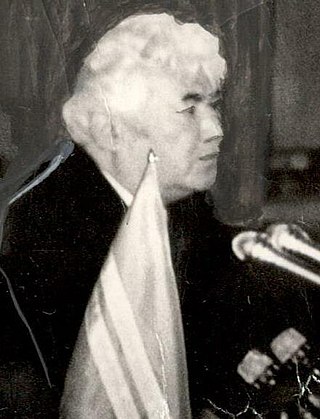
Rahmon Nabiyevich Nabiyev, also spelled Rakhmon Nabiev, was a Tajik politician who served as the First Secretary of the Communist Party of Tajikistan from 1982 to 1985 and twice as the 2nd President of Tajikistan from 23 September 1991 to 6 October 1991 and from 2 December 1991 to 7 September 1992. He was also partly responsible for the Tajik Civil War. Rising out of the regional nomenklatura, Nabiyev ascended to power in 1982 as First Secretary of the Communist Party of Tajikistan. In 1985, he was ousted in a corruption scandal.

The Tajikistani Civil War, also known as the Tajik Civil War, began in May 1992 and ended in June 1997. Regional groups from the Garm and Gorno-Badakhshan regions of Tajikistan rose up against the newly-formed government of President Rahmon Nabiyev, which was dominated by people from the Khujand and Kulob regions. The rebel groups were led by a combination of liberal democratic reformers and Islamists, who would later organize under the banner of the United Tajik Opposition. The government was supported by Russian military and border guards.
The United Nations Mission of Observers in Tajikistan (UNMOT) was a peacekeeping mission established by the United Nations Security Council in December 1994, and its mandate expired in May 2000. Its purpose was to monitor peace agreements during and after the Tajikistan Civil War. The observers were first deployed in the wake of the ceasefire, in 1994, between the ruling government of Tajikistan, led by Emomali Rahmonov, and the United Tajik Opposition. After the UN-sponsored armistice ended the war in 1997, the UN expanded the mission's original mandate to monitor the peace and demobilization. The mission was headquartered in Dushanbe, Tajikistan.

Human rights in Tajikistan, a country in Central Asia, have become an issue of international concern. The access to basic human rights remains limited, with corruption in the government and the systematic abuse of the human rights of its citizens slowing down the progress of democratic and social reform in the country.
Colonel Mahmud Khudoiberdiyev was a rebel leader in Tajikistan who, while initially an ally of Tajik President Emomali Rahmon, became an opposition figure later on in his life. He is a former member of the Central Committee of the Tajik Communist Party and a former major in the Soviet Army. He also served as commander of the Tajik Army's First Brigade.
The Popular Movement"Revival" was a political party in Tajikistan in the years of independence and civil war (1989–1997). It was founded on 14 September 1989, by members of the Tajik intelligentsia, among them Tohir Abdujabbor, with a moderate nationalist, secularist and liberal democratic program.
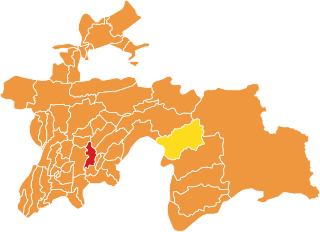
Presidential elections were held in Tajikistan on 6 November 2013. Incumbent President Emomali Rahmon was re-elected with a reported 84% of the vote on a turnout of 86.6%.
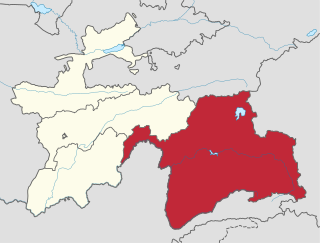
The Gorno-Badakhshan clashes consisted of fighting between Tajik government forces and an armed group led by Tolib Ayyombekov in Tajikistan's semi-autonomous Gorno-Badakhshan province in late July 2012. The Western media described the fighting as the worst in Tajikistan since 2010 or the 1992–1997 civil war.

Tolibbek Ayyombekov, commonly known as Tolib Ayombekov, is an Ismaili Shia Pamiri jailed ex-opposition fighter from Tajikistan, who was involved in the Gorno-Badakhshan clashes in 2012 against the government forces of ruling Tajik president Emomali Rahmon. Until his arrest in June 2022, he was particularly influential in his home Khlebzavod microraion of Khorog.

The Ministry of Defence of Tajikistan is the defence ministry of Tajikistan, overseeing the Tajik Ground Forces, Air Force, Mobile Forces. It also oversees purchases of equipment for the Tajik military. The other branches of the military, such as the Border and Internal Troops, are overseen by the Interior Ministry of Tajikistan. The Defence Ministry was founded in 1993 with Russian assistance.
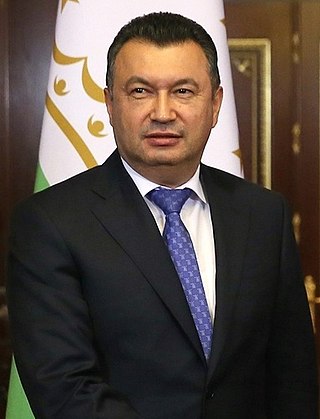
Qohir Rasulzoda is a Tajik politician who is serving as the Prime Minister of Tajikistan since 23 November 2013. He is a member of the People's Democratic Party of Tajikistan.

A constitutional referendum was held in Tajikistan on 22 May 2016. A total of 41 constitutional amendments were proposed. The changes included:
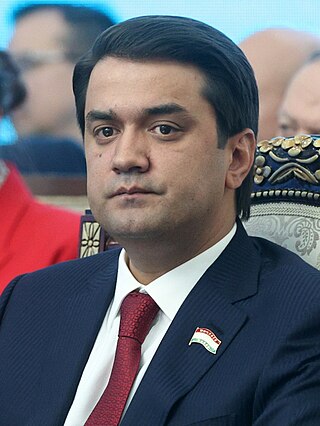
Rustam Emomali is a Tajik politician who is the current Chairman of the National Assembly of Tajikistan, Mayor of Dushanbe and the eldest son of Emomali Rahmon, the long-standing authoritarian leader of Tajikistan. Emomali's father appointed Emomali as the mayor of Dushanbe when he was 29 years old.

Corruption in Tajikistan is a widespread phenomenon that is found in all spheres of Tajik society. The situation is essentially similar to that in the other former Soviet republics of Central Asia. Reliable specifics about corruption can be difficult to come by, however, as can hard information about the effectiveness of supposed anti-corruption initiatives.
Events in the year 2020 in Tajikistan.
The Popular Front of Tajikistan was a politicized paramilitary movement composed of volunteers that fought for the government during the Tajik Civil War. Up to 8,000 fighters served as part of the front.












